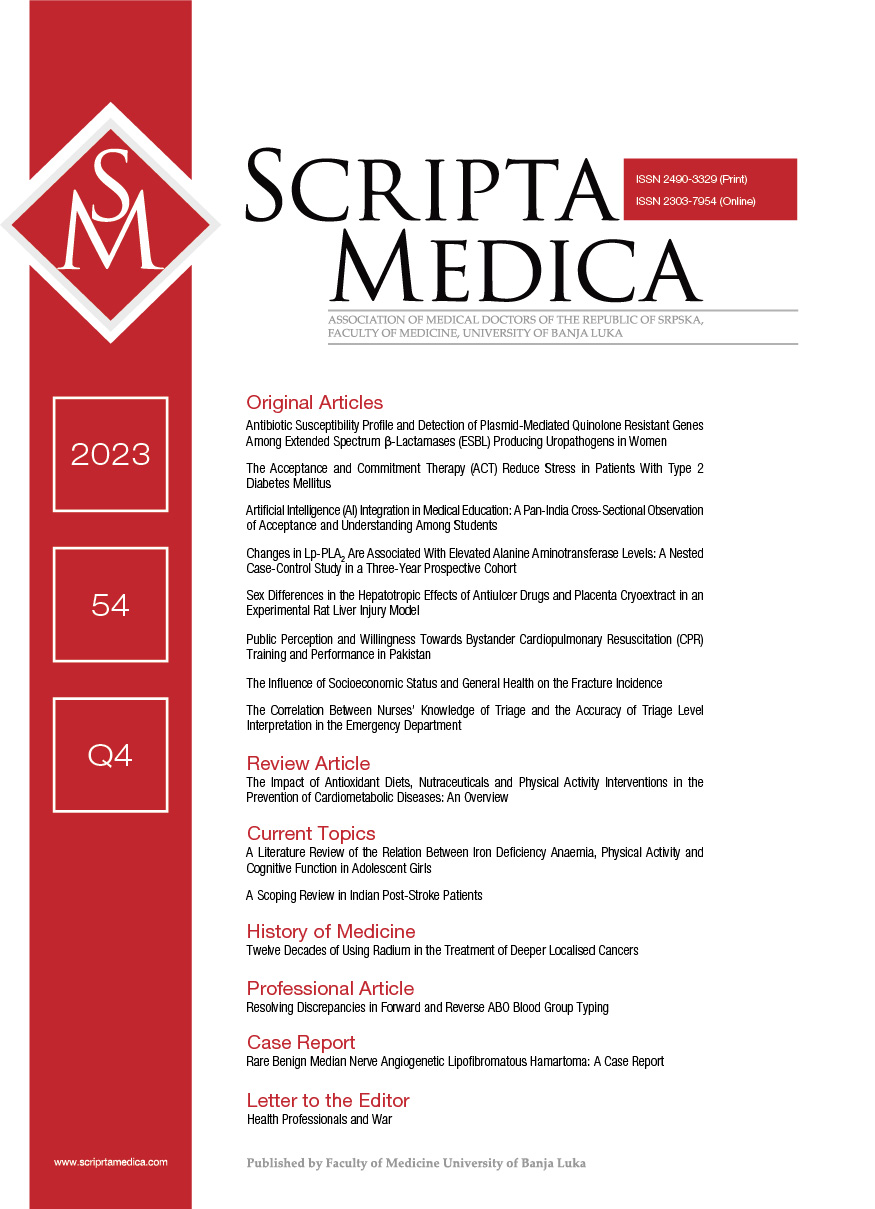Artificial Intelligence (AI) Integration in Medical Education: A Pan-India Cross-Sectional Observation of Acceptance and Understanding Among Students
Abstract
Background/Aim: From accurate diagnostics to personalised treatment plans, artificial intelligence (AI) has the potential to revolutionise healthcare. The abundance of medical data has led to AI being employed for accurate diagnoses, treatment protocols and patient care. Students' perception of AI integration in medical education is crucial for its successful implementation. This study aimed to assess the acceptance and understanding of AI integration among students in medical education across different regions of India through a cross-sectional observation.
Methods: A pan-India survey was conducted among medical students between 1 August 2023 to 20 August 2023 with a pre-validated questionnaire covering AI awareness and understanding through Google Form, circulated via WhatsApp.
Results: A total of 730 medical students completed the survey of which 58.6 % were males and 41.4 % were females. Most students (80.7 %) knew about AI, but 53.6 % had limited awareness of AI in medicine. Opinions on AI integration was diverse, with 46.8 % in favour. Workshops (45.2 %) and lectures (31.1 %) were preferred learning formats. Students were interested in various AI topics and expect AI to positively impact medicine (45.9 %). Radiology, surgery and general medicine were predicted to be most influenced by AI. Concerns about overreliance on AI (49.2 %) and lack of empathy (43.7 %) were highlighted.
Conclusions: Medical students in India display a keen interest in AI and its integration into medical education. To fully harness AI's potential in healthcare, comprehensive AI curricula and faculty training are needed. Students are aware of the challenges and opportunities, emphasising the importance of balanced AI adoption in medical practice and education.
References
Iverson LI, Young JN, Ecker RR, Ennix Jr CL, Lau G, Stallone R, et al. Closure of bronchopleural fistulas by an omental pedicle flap. Closure of bronchopleural fistulas by an omental pedicle flap. Am J Surg 1986 Jul;152(1):40-2.
Hamet P, Tremblay J. Artificial intelligence in medicine. Metabolism 2017 Apr 1;69:S36-40.
Amisha, Malik P, Pathania M, Rathaur VK. Overview of artificial intelligence in medicine. J Family Med Prim Care 2019 Jul;8(7):2328-31.
Mack H. Digital health startup Buoy launches AI-powered, symptom-checking chatbot. Mobihealthnews, 2017 [Internet]. [Cited: 16-July-2023]; Available from: https://www.mobihealthnews.com/content/digital-health-startup-buoy-launches-ai-powered-symptom-checking-chatbot.
Buoy Health: Check symptoms & find the right care [Internet]. [Cited: 18-July-2023]; Available from: https://www.buoyhealth.com/.
Digital cognitive assessments for medical practices. Linus health [Internet]. [Cited: 19-July-2023]; Available from: https://linushealth.com/healthcare-delivery.
Khafaji MA, Safhi MA, Albadawi RH, Al-Amoudi SO, Shehata SS, Toonsi F. Artificial intelligence in radiology: Are Saudi residents ready, prepared, and knowledgeable. Saudi Med J 2022 Jan;43(1):53-60.
Hosny A, Parmar C, Quackenbush J, Schwartz LH, Aerts HJWL. Artificial intelligence in radiology. Nat Rev Cancer 2018 Aug;18(8):500-10.
McCoy LG, Nagaraj S, Morgado F, Harish V, Das S, Celi LA. What do medical students actually need to know about artificial intelligence? NPJ Digit Med 2020 Jun 19;3:86. doi: 10.1038/s41746-020-0294-7.
Imran N, Jawaid M. Artificial intelligence in medical education: Are we ready for it? Pak J Med Sci 2020 Jul-Aug;36(5):857-9.
Wood EA, Ange BL, Miller DD. Are we ready to integrate artificial intelligence literacy into medical school curriculum: students and faculty survey. J Med Educ Curric Dev 2021 Jun 23;8:23821205211024078. doi: 10.1177/23821205211024078.
Gerke S, Minssen T, Cohen G. Ethical and legal challenges of artificial intelligence-driven healthcare. Artificial Intelligence in Healthcare 2020:295–336.
Chan KS, Zary N. Applications and challenges of implementing artificial intelligence in medical education: integrative review. JMIR Med Educ 2019 Jun 14;5(1):e13930. https://doi.org/10.2196/13930.
Paranjape K, Schinkel M, Panday RN, Car J, Nanayakkara P. Introducing artificial intelligence training in medical education. JMIR Med Educ 2019 Dec 3;5(2):e16048. doi: 10.2196/16048.
Yang Y, Shulruf B. An expert-led and artificial intelligence system-assisted tutoring course to improve the confidence of Chinese medical interns in suturing and ligature skills: a prospective pilot study. J Educ Eval Health Prof 2019 Apr 10;16:7. doi:10.3352/jeehp.2019.16.7.
16. Masters K. Artificial intelligence developments in medical education: a conceptual and practical framework. MedEdPublish. 2020 Oct 26;9(239):239. doi:10.15694/mep.2020.000239.1.
Aggarwal OP. Bayes and minimax procedures in sampling from finite and infinite populations--I. Ann Math Statist 1959;30(1):206-18.
Pucchio A, Rathagirishnan R, Caton N, Gariscsak PJ, Del Papa J, Nabhen JJ, et al. Exploration of exposure to artificial intelligence in undergraduate medical education: a Canadian cross-sectional mixed-methods study. BMC Med Educ 2022 Nov 28;22(1):815. doi:10.1186/s12909-022-03896-5.
McLennan S, Meyer A, Schreyer K, Buyx A. German medical students´ views regarding artificial intelligence in medicine: A cross-sectional survey. PLOS Digital Health 2022 Oct 4;1(10):e0000114. doi:10.1371/journal.pdig.0000114.
Ejaz H, McGrath H, Wong BL, Guise A, Vercauteren T, Shapey J. Artificial intelligence and medical education: A global mixed-methods study of medical students’ perspectives. Digital Health 2022 May;8:20552076221089099. doi:10.1177/20552076221089099.
Gong B, Nugent JP, Guest W, Parker W, Chang PJ, Khosa F, et al. Influence of artificial intelligence on Canadian medical students' preference for radiology specialty: ANational survey study. Acad Radiol 2019 Apr;26(4):566-577.
Sit C, Srinivasan R, Amlani A, Muthuswamy K, Azam A, Monzon L, et al. Attitudes and perceptions of UK medical students towards artificial intelligence and radiology: a multicentre survey. Insights Imaging 2020 Feb 5;11(1):14. doi: 10.1186/s13244-019-0830-7.
Ötleş E, James CA, Lomis KD, Woolliscroft JO. Teaching artificial intelligence as a fundamental toolset of medicine. Cell Rep Med. 2022 Dec 20;3(12):100824. doi: 10.1016/j.xcrm.2022.100824.
- Authors retain copyright and grant the journal right of first publication with the work simultaneously licensed under a Creative Commons Attribution License that allows others to share the work with an acknowledgement of the work's authorship and initial publication in this journal.
- Authors are able to enter into separate, additional contractual arrangements for the non-exclusive distribution of the journal's published version of the work (e.g., post it to an institutional repository or publish it in a book), with an acknowledgement of its initial publication in this journal.
- Authors are permitted and encouraged to post their work online (e.g., in institutional repositories or on their website) prior to and during the submission process, as it can lead to productive exchanges, as well as earlier and greater citation of published work (See The Effect of Open Access).

